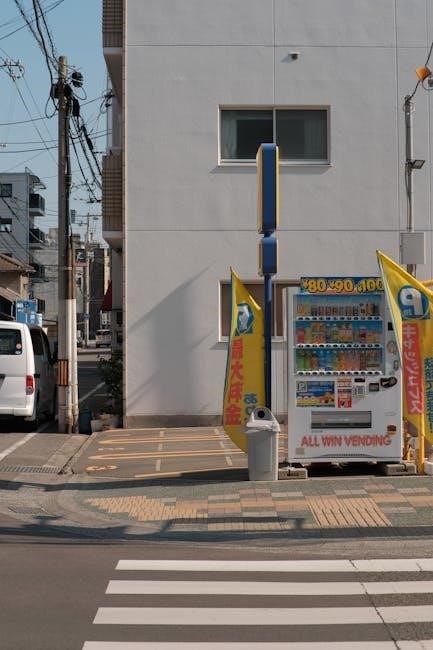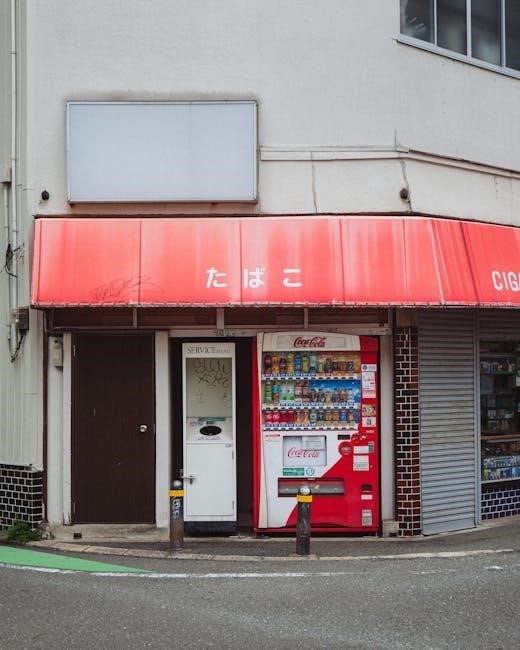vending machine contract pdf
A vending machine contract is a legal agreement between a vendor and a property owner, outlining terms for placing and operating machines on the premises.
These contracts prevent misunderstandings by detailing installation, maintenance, and financial arrangements, ensuring smooth operations for both parties.
Using a vending machine contract template streamlines the process, ensuring compliance and saving time, while allowing customization to fit specific business needs.
This guide will explore key components, types of contracts, and expert tips for creating and negotiating effective vending machine agreements.
Key Components of a Vending Machine Contract
A vending machine contract includes parties involved, term agreements, payment terms, machine ownership, liability, insurance, and termination conditions to ensure clarity and mutual understanding.
2.1. Parties Involved
The vending machine contract clearly identifies the parties involved, typically including the vendor (machine operator) and the location owner (where machines are placed).
The vendor is responsible for installing, restocking, and maintaining the machines, while the location owner provides space and access for operation.
Sometimes, third-party suppliers may be involved for specific products or services, ensuring all roles and responsibilities are well-defined.
- The vendor owns the machines and manages inventory.
- The location owner grants permission for machine placement and may receive a share of revenue.
Clear identification of parties ensures accountability and smooth communication, preventing potential disputes.
Legal templates, such as those from LeapLaw, often include sections to outline these roles explicitly.
2.2. Term of the Agreement
The term of a vending machine contract outlines the duration of the agreement, including start and end dates, and renewal or termination options.
Agreements typically range from one to five years, with options for renewal upon mutual agreement or automatic extension unless terminated.
Termination clauses often require a 30-day written notice, allowing either party to exit the contract under specified conditions, such as nonperformance or breach of terms.
- The contract may include a probationary period to assess performance before committing to the full term.
- Renewal terms may involve revised payment structures or updated machine requirements.
Clear term definitions ensure both parties understand their obligations and expectations throughout the agreement period.
This structure prevents misunderstandings and provides a framework for long-term collaboration.
2.3. Payment Terms
Payment terms in a vending machine contract specify the financial obligations of both parties, including fees, schedules, and methods of payment.
Typically, the client agrees to pay a fixed monthly fee (e.g., $500) or a percentage of revenue generated by the machines.
Payments are usually due within 30 days of invoicing, with late fees applicable for delayed payments.
- Revenue-sharing models may require the vendor to remit a portion of sales to the location owner.
- Payment methods can include checks, bank transfers, or digital payments.
These terms ensure transparency and fairness, preventing disputes over financial obligations.
Clear payment structures are essential for maintaining a smooth and profitable partnership.
2.4. Machine Ownership and Maintenance
Ownership of vending machines typically remains with the vendor, as specified in the contract, ensuring the vendor retains control over the equipment.
The vendor is responsible for installing, maintaining, and restocking the machines, while the location owner provides access for these services.
Regular maintenance is crucial to ensure machines function properly and meet customer expectations, preserving revenue generation for both parties.
- The vendor must address malfunctions promptly to avoid service disruptions.
- Ownership transfer to the client is uncommon unless explicitly agreed upon.
Clear maintenance terms protect both parties and ensure seamless operation of the vending machines.
Proper upkeep is vital for customer satisfaction and sustained profitability.
2.5. Liability and Insurance
Vending machine contracts must address liability and insurance to protect both parties from potential risks and damages.
The vendor is typically liable for any injuries or property damage caused by the vending machines, ensuring they are in good working condition.
Insurance requirements and liability clauses should be clearly outlined in the contract to avoid disputes and ensure financial protection for both parties.
Regular insurance updates and compliance checks are essential to maintain valid coverage throughout the agreement term.
2.6. Termination Conditions
Vending machine contracts outline specific termination conditions to protect both parties’ interests and provide a clear exit strategy.
Either party may terminate the agreement with a written notice, typically 30 days, if the other party breaches terms or fails to meet obligations.
Upon termination, the vendor must remove all machines and equipment, restoring the premises to its original condition.
Any outstanding payments or disputes should be resolved before finalizing the termination.
A well-defined termination clause ensures a smooth process and minimizes potential conflicts.
Types of Vending Machine Contracts
Vending machine contracts vary, with common types including operational agreements, lease agreements, and revenue-sharing agreements, each tailored to specific business needs and operational preferences.
3.1. Operational Agreement
An operational agreement is a common type of vending machine contract where the vendor retains ownership of the machine and handles all operational responsibilities.
This includes installation, maintenance, restocking, and servicing, while the property owner provides access to the premises for these activities.
The agreement typically outlines the terms of machine placement, product offerings, and the split of revenue, if applicable.
Operational agreements are popular due to their simplicity and flexibility, allowing both parties to focus on their core responsibilities without additional financial burdens.
They are often preferred by property owners who want minimal involvement in the day-to-day management of the vending machines.
3.2. Lease Agreement
A lease agreement in the context of vending machines allows a property owner to lease machines from a vendor for a specified period and fee.
Under this arrangement, the property owner typically operates the machines, handling restocking and maintenance, while the vendor retains ownership.
Lease agreements often include terms such as lease duration, payment structures, and responsibilities for repairs and upgrades.
This type of contract is beneficial for property owners who want control over the vending operations but may not have the capital to purchase machines outright.
It provides a predictable cost structure and ensures access to modern equipment without upfront investment.
3.3. Revenue-Sharing Agreement
A revenue-sharing agreement is a contract where the vending machine operator and the property owner split the profits generated by the machines.
This arrangement is mutually beneficial, as both parties have a financial incentive to maximize sales and maintain customer satisfaction.
Typically, the agreement outlines the percentage of revenue each party receives, such as a 50/50 split, and the frequency of payments.
The property owner gains a steady income stream without upfront costs, while the operator benefits from access to a prime location.
Such agreements often include terms for monitoring sales, handling disputes, and adjusting the revenue split if circumstances change.
For example, if $1,000 in monthly sales is generated, the property owner might receive $500, creating a win-win scenario for both parties.

Benefits of Using a Vending Machine Contract Template
Using a vending machine contract template offers numerous advantages, including saving time and ensuring legal compliance.
Templates provide a structured format, covering all essential clauses, such as payment terms, machine ownership, and termination conditions.
This eliminates the need to draft an agreement from scratch, reducing the risk of omitting critical details.
Additionally, templates promote consistency and clarity, helping to prevent misunderstandings between the vendor and property owner.
They also allow for easy customization, enabling users to tailor the agreement to their specific needs while maintaining professional standards.
Moreover, templates often include industry-standard language, ensuring that the agreement is fair and legally binding for both parties.
Overall, a vending machine contract template simplifies the process of creating a clear and comprehensive agreement, saving effort and reducing potential disputes.

How to Choose the Right Vending Machine Contract Template
Choosing the right vending machine contract template involves evaluating its clarity, comprehensiveness, and relevance to your specific business needs.
Ensure the template includes essential clauses such as payment terms, machine ownership, liability, and termination conditions.
Opt for a template that allows customization to fit your unique requirements, such as revenue-sharing models or lease agreements.
Verify that the template complies with local laws and regulations to avoid legal disputes.
Additionally, consider templates from reputable sources, such as legal document providers or industry-specific platforms, to ensure reliability and professionalism.
Lastly, review user reviews or expert recommendations to identify the most effective and widely accepted templates in the vending machine industry.

Customizing Your Vending Machine Contract
Customizing your vending machine contract ensures it aligns with your specific business needs and operational requirements.
Start by identifying key clauses that require tailoring, such as payment terms, machine ownership, and liability provisions.
Add specific details like maintenance schedules, restocking responsibilities, and product offerings to reflect your unique agreement.
Incorporate clauses that address site-specific conditions, such as access restrictions or utility responsibilities.
Consult legal professionals to ensure the customized contract complies with local laws and industry standards.
Finally, review and revise the template thoroughly to eliminate any ambiguities and ensure clarity for both parties involved.
Customization ensures the contract is practical, enforceable, and tailored to your vending machine business operations.
Legal Considerations in Vending Machine Contracts
Legal considerations are crucial when drafting a vending machine contract to ensure compliance with local, state, and federal laws.
Key areas include liability clauses, insurance requirements, and indemnification provisions to protect both parties in case of disputes or damages.
Contracts must comply with consumer protection laws, particularly regarding product safety and refund policies for defective items.
Intellectual property rights should be addressed if branded products or proprietary technology are involved.
Data privacy laws may apply if machines collect customer information, such as through cashless payment systems.
Dispute resolution mechanisms, like arbitration or mediation, should be clearly outlined to avoid costly litigation.
A thorough legal review by a qualified attorney is essential to ensure the contract is enforceable and meets all legal standards.
Including a governing law clause ensures clarity on which jurisdiction’s laws will apply to the agreement.
Addressing these legal aspects safeguards both parties and ensures a smooth, legally sound vending machine operation.
Common Mistakes to Avoid When Drafting a Vending Machine Contract
When drafting a vending machine contract, avoid vague terms regarding payment structures, machine ownership, and maintenance responsibilities.
Clearly define the term of the agreement and termination conditions to prevent disputes over contract duration or early termination penalties.
Do not overlook liability clauses, as failing to address potential damages or theft can lead to financial losses.
Ensure all parties understand their obligations, including restocking, maintenance, and revenue sharing, to avoid misunderstandings.
Never skip legal oversight; a qualified attorney should review the contract to ensure compliance with local laws and protect both parties’ interests.
Avoid using generic templates without customization, as this may fail to address specific business needs or local regulations.
By addressing these common pitfalls, you can create a clear, enforceable, and fair vending machine contract.

Negotiating the Terms of a Vending Machine Contract
Negotiating a vending machine contract requires collaboration and open communication between the vendor and location owner to ensure mutually beneficial terms.
Understanding each party’s needs, such as revenue sharing, payment schedules, and machine maintenance, is crucial for a fair agreement.
Key areas to negotiate include commission rates, machine placement, and service frequency to maximize profitability and convenience for both parties.
Clarifying responsibilities for repairs, restocking, and liability can prevent future disputes and ensure smooth operations.
Both parties should seek legal advice to ensure all terms are clear, enforceable, and aligned with their business goals.
A well-negotiated contract fosters a long-term partnership, benefiting both the vendor and the location owner.
Executing and Managing the Vending Machine Contract
Once the contract is negotiated and agreed upon, both parties must ensure proper execution and management to maintain a smooth partnership.
This involves signing the agreement, keeping records, and establishing clear communication channels for updates or issues.
Regular monitoring of sales performance and machine functionality is essential to meet contractual obligations and address any discrepancies promptly.
Scheduled maintenance and restocking should be documented to ensure compliance with the agreed terms.
Both parties should review and adjust the contract as needed to reflect changes in business needs or market conditions.
Transparent reporting and payment schedules must be adhered to, and any disputes should be resolved through the agreed-upon mediation process.
Effective management ensures the contract remains beneficial for both parties and fosters a positive, long-term relationship.
Renewing or Terminating a Vending Machine Contract
Renewing or terminating a vending machine contract involves careful evaluation of performance and adherence to the terms outlined in the agreement.
Both parties should assess whether continuing the partnership aligns with their business goals and if the contract has met its intended objectives.
Termination clauses typically require written notice, often 30 days, to allow for an orderly transition, including the removal of machines and final payments.
Upon termination, the vendor must return any property or equipment provided by the location owner and ensure no liabilities remain unresolved.
Renewal may involve renegotiating terms, such as payment structures or machine upgrades, to reflect current business needs or market conditions.
Clear communication and mutual agreement are crucial to ensure a smooth renewal or termination process, maintaining a professional relationship.
A well-crafted vending machine contract is essential for ensuring smooth operations, protecting both parties, and fostering long-term partnerships.
By understanding the key components, types of agreements, and legal considerations, you can create a comprehensive contract tailored to your needs.
Next steps include reviewing and customizing templates, seeking legal advice, and regularly monitoring the agreement’s performance to ensure compliance and satisfaction.
Leverage the insights from this guide to confidently negotiate, implement, and manage your vending machine contracts effectively.
- Use professional templates to streamline the process.
- Consult legal experts to avoid potential pitfalls.
- Review and update contracts periodically to reflect changing business needs.
With careful planning and execution, your vending machine contract will serve as a solid foundation for a successful and profitable partnership.

